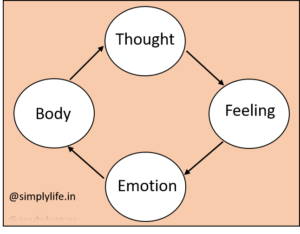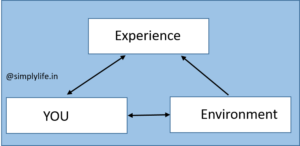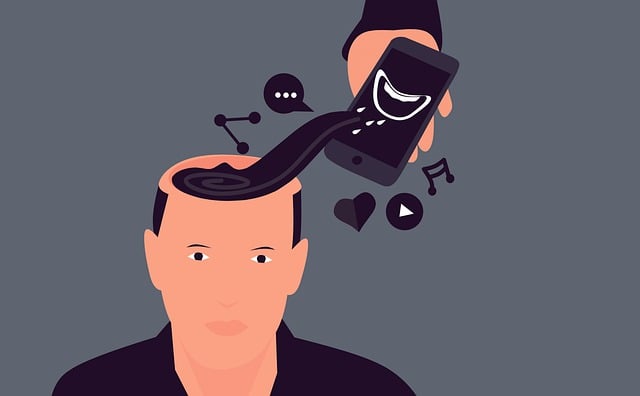Research suggests overthinking is common now a days. Statistically 73% of people in the age group of 25 to 35 year chronically do overthinking, while 52% of people in the age group of 45 to 55 years do overthinking.
In this post we will discuss reasons and ways to handle overthinking.
Defining overthinking
It is a state where you think excessively over one or multiple of matters. It gives no results, but you become worried and a habitual over thinker.
Why overthinking happens
The reasons for overthinking are many. It can be due to genetic nature, family situation, personal values, principles, beliefs etc. For discussion purposes, the following reasons are broadly attributable to overthinking.
Sensitiveness
Some people are by nature sensitive to things happening around them. Whatever happens in and around them quickly trigger their emotions. It leads to a cyclic thought process. Diagrammatically it can be presented as below:

Trauma or loss
The mental impact of any trauma or loss is long lasting. You find it difficult to overcome easily. Those memories associated with trauma or loss keep on replaying leading you to an overthinker.
Financial Problem
Once you enter adulthood, one of the prime responsibility is to earn and meet your needs as well as need of loved ones. Any problem related to finance create insecurity. Doubts arise whether you would be able to meet the needs. A family passing through financial problems may make its members overthinker. Among all concerns financial problem has highest impact in our thinking.
Relationship problem
We expect an outcome, response, reaction or reward from others for the activity we do. This expectation is based on our own perception. However, perception varies from person to person. Therefore, expectation does not match with other people. This leads to relationship problem. It is more pertinent is case of close relationships.
Lack of clarity and action
If you are an overthinker, it could be due to lack of clarity and action. You are yet to understand yourself what you aiming for. Therefore not able to take action. Inaction leads to more confusion and you end up being an overthinker.
Perfectionist
One of the personality trait of many people is to do things in perfection. However, a perfect work or situation hardly exist. In most cases, it could be near perfection. If you are perfectionist, you will keep on thinking about the work in hand or work already done – how it could be better.
Childhood programming
Research suggest a child’s personality take shape in the initial 1000 days. If the parent is in the habit of overthinking, it will get instilled in the baby also. If the child is brought up in a confusing, stressful environment, he or she is most likely to become overthinker.
Peer pressure
This is one of the major reason of overthinking among the young generation. In a competitive environment and with the advent of technology, people are getting more exposed to expectation and possibilities. It constantly demands to be at par with others and socially relevant.
Your reason for overthinking could be one or multiple of the above reasons.
Ways to handle overthinking
Once you understand the reason of overthinking, it become easier to handle. All you need is awareness, Practice certain principles and technique to manage it.
Principles No.1
Our quality of life depends on our environment and experiences.

Thoughts come from environment, which gives us experience. Therefore, be in a comfortable environment to get a good experience.
Quality of life = Quality of Experience
It says a thought lingering more than 15 minutes in your mind will affect your emotion. It will lead to more thoughts. A thought can be triggered by senses like touch, smell, eyesight, hearing and taste.
It will trigger either a resourceful state [happiness, joy, clarity, love, certainty] or an unresourceful state [guilt, grief, hurt, fear, stuck, conflict, anger]
Once you take control of your life by choosing the right environment, your experience will change.
Principle No.2
The general tendency of human is to blame self or others for an unpleasant experience. However, both are wrong. You should not play a victim role nor victimise anybody. Simply, take responsibility. Admit or accept whatever happens and find ways how not to repeat it.
Techniques to get resourceful state
Respond do not react
Jeff Keller in his book “Attitude is Everything” has suggested to respond to a situation and not to react. Generally, if anything adverse happens to you tendency will be to blame the world, overwhelmed with emotions. Stop. Take a pause. Think over it – what best you can do. Act on it. Once you find the solution, forget about the problem. Stay focused on the solution and work on it.
Apply Delete, Distort, Generalisation (DDG)
Whenever a disempowering though comes to your mind apply this technique
Delete the thought with inner talk – “so what, I am working on it & I am in control”.
Distort the thought with ‘what do you want’. In other word, counter the thought with a thought which you want. For example, you have an examination to take and continuously thought is coming that you will fail. Replace this thought deliberately saying I will pass.
Generalise or probe your thought with questions – is it true?, is it real?, does it happen always?, is it for sure? Suppose, a thought is coming about your low confidence level. Ask yourself whether you were always low on confidence or it is occasional. Don’t get carried out just because the thought came. Don’t accept it. If it is occasional apply ‘delete’ option; If it is true apply ‘distort’ option and move ahead.
Apply ‘as if’ technique
Whenever disempowering thought comes to mind – i) Correct your Pasture/Physiology as if everything is fine ii) breath normally, iii) chin up and put a smile on face and iv) have an inner dialogue on what you want or gratitude to all you have, which will empower you.
Anchoring technique
It is a hook to a subconscious mind. It could be through Visual, Audio or Kinestic. This is something which assure you normalcy or excitement. It could be recalling a past achievement, strong quote, a physical gesture, a song, a book etc. Fire/Use the anchor or hook or gesture at the peak of your ongoing thought.
If you don’t have a known anchor now, you can install one for future. Find out what could be a powerful anchor that will motivate you to overcome disempowering thought – quote, gesture, song, book etc. Next time you overthink, just use that anchor. If you repeat 4-5 times, it will work effectively.
Swish Technique
Sit quietly, eye closed, back upright and breathe normally. Let all thought come and go. At the peak imagine all your thought dissolving and emerging a new thought accompanied by visual which you want. Keep recalling the new image for 30 seconds. Keeping recalling the new thoughts and visuals as and when required.
Conclusion
Overthinking is just a habit. If you understand and become aware about it, you can easily handle it. As the saying goes nothing work until you work. Practice the given principles and technique on daily basis. Take it easy, overthinking will be mellowed down.
Read Healthy Mind in a Healthy Body to know how to own it.
